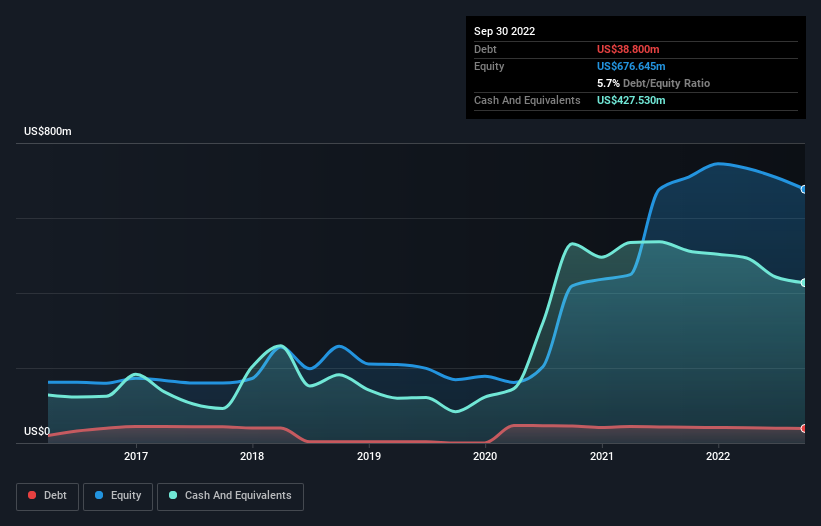- United States
- /
- Specialty Stores
- /
- NYSE:BYON
Overstock.com (NASDAQ:OSTK) Has A Pretty Healthy Balance Sheet

Howard Marks put it nicely when he said that, rather than worrying about share price volatility, 'The possibility of permanent loss is the risk I worry about... and every practical investor I know worries about.' It's only natural to consider a company's balance sheet when you examine how risky it is, since debt is often involved when a business collapses. We note that Overstock.com, Inc. (NASDAQ:OSTK) does have debt on its balance sheet. But should shareholders be worried about its use of debt?
Why Does Debt Bring Risk?
Debt assists a business until the business has trouble paying it off, either with new capital or with free cash flow. Ultimately, if the company can't fulfill its legal obligations to repay debt, shareholders could walk away with nothing. However, a more common (but still painful) scenario is that it has to raise new equity capital at a low price, thus permanently diluting shareholders. By replacing dilution, though, debt can be an extremely good tool for businesses that need capital to invest in growth at high rates of return. The first step when considering a company's debt levels is to consider its cash and debt together.
View our latest analysis for Overstock.com
What Is Overstock.com's Debt?
You can click the graphic below for the historical numbers, but it shows that Overstock.com had US$38.8m of debt in September 2022, down from US$42.1m, one year before. However, its balance sheet shows it holds US$427.5m in cash, so it actually has US$388.7m net cash.

How Healthy Is Overstock.com's Balance Sheet?
Zooming in on the latest balance sheet data, we can see that Overstock.com had liabilities of US$233.3m due within 12 months and liabilities of US$42.3m due beyond that. Offsetting these obligations, it had cash of US$427.5m as well as receivables valued at US$20.8m due within 12 months. So it can boast US$172.7m more liquid assets than total liabilities.
This surplus suggests that Overstock.com is using debt in a way that is appears to be both safe and conservative. Given it has easily adequate short term liquidity, we don't think it will have any issues with its lenders. Simply put, the fact that Overstock.com has more cash than debt is arguably a good indication that it can manage its debt safely.
In fact Overstock.com's saving grace is its low debt levels, because its EBIT has tanked 57% in the last twelve months. When it comes to paying off debt, falling earnings are no more useful than sugary sodas are for your health. The balance sheet is clearly the area to focus on when you are analysing debt. But ultimately the future profitability of the business will decide if Overstock.com can strengthen its balance sheet over time. So if you're focused on the future you can check out this free report showing analyst profit forecasts.
Finally, a business needs free cash flow to pay off debt; accounting profits just don't cut it. While Overstock.com has net cash on its balance sheet, it's still worth taking a look at its ability to convert earnings before interest and tax (EBIT) to free cash flow, to help us understand how quickly it is building (or eroding) that cash balance. Over the last three years, Overstock.com actually produced more free cash flow than EBIT. That sort of strong cash generation warms our hearts like a puppy in a bumblebee suit.
Summing Up
While it is always sensible to investigate a company's debt, in this case Overstock.com has US$388.7m in net cash and a decent-looking balance sheet. The cherry on top was that in converted 134% of that EBIT to free cash flow, bringing in US$1.9m. So is Overstock.com's debt a risk? It doesn't seem so to us. There's no doubt that we learn most about debt from the balance sheet. But ultimately, every company can contain risks that exist outside of the balance sheet. For example - Overstock.com has 3 warning signs we think you should be aware of.
When all is said and done, sometimes its easier to focus on companies that don't even need debt. Readers can access a list of growth stocks with zero net debt 100% free, right now.
Valuation is complex, but we're here to simplify it.
Discover if Beyond might be undervalued or overvalued with our detailed analysis, featuring fair value estimates, potential risks, dividends, insider trades, and its financial condition.
Access Free AnalysisHave feedback on this article? Concerned about the content? Get in touch with us directly. Alternatively, email editorial-team (at) simplywallst.com.
This article by Simply Wall St is general in nature. We provide commentary based on historical data and analyst forecasts only using an unbiased methodology and our articles are not intended to be financial advice. It does not constitute a recommendation to buy or sell any stock, and does not take account of your objectives, or your financial situation. We aim to bring you long-term focused analysis driven by fundamental data. Note that our analysis may not factor in the latest price-sensitive company announcements or qualitative material. Simply Wall St has no position in any stocks mentioned.
About NYSE:BYON
Beyond
Operates as an online retailer of furniture and home furnishings products in the United States and Canada.
Mediocre balance sheet low.
Similar Companies
Market Insights
Community Narratives




